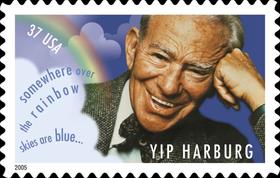Stories of Standards: “Over the Rainbow”
Tune in to First Take with Lando and Chavis – weekdays from 6-9 am MT – for Stories of Standards to hear our favorite versions of this song all week long!
Stories of Standards is sponsored by ListenUp – If you love music, you’ll love ListenUp.
“Over the Rainbow” (1938) by Harold Arlen and Yip Harburg first appeared in “The Wizard of Oz” in 1939, with Judy Garland singing. MGM held two premieres, one in Hollywood at Grauman’s Chinese Theater and the other at the Capitol Theatre in New York City. Shortly afterwards big band records hit the top ten lists; Glenn Miller, with Ray Eberle singing, made #1, while the Bob Crosby Orchestra with Teddy Grace went to #2. “Over the Rainbow” became Judy Garland’s signature song, and her 1939 recording entered the National Academy of Recording Arts and Sciences Grammy Hall of Fame in 1981. The “Songs of the Century” project in 2001 named “Over the Rainbow” the best song of the twentieth century.
When MGM set out to produce “The Wizard of Oz” they endured a number of changes from their original hopes: Jerome Kern’s ill health prevented him from scoring the film; Twentieth Century-Fox refused to release Shirley Temple and four directors worked on the film. With Harold Arlen (1905-1986), Yip Harburg (1896-1981) and Judy Garland (1922-1969), the film went on to receive six Academy Award nominations, winning in Best Score for the movie and Best Song for “Over the Rainbow”. Harold Arlen said that after the “lemon drop” songs (“Ding-Dong! The Wicked Witch Is Dead,” “The Merry Old Land of Oz,” and “We’re Off to See the Wizard”) they needed a ballad. The melody arrived while Arlen was out driving and Arlen was quoted as saying “It was as if the Lord said, ‘Well, here it is, now stop worrying about it!’”. Harburg initially thought it too lush for a twelve-year-old girl in a farmyard, but Ira Gershwin suggested a quicker tempo, less harmonization and talked Harburg into writing the title and lyrics. Once created, “Over the Rainbow” had to run the gauntlet of MGM executives, who cut the song from the movie three times. Eventually, Arthur Freed convinced Louis B. Mayer to keep the song in the film.

9(MDA3NDU1Nzc2MDEzMDUxMzY3MzAwNWEzYQ004))
Become a Member
Join the growing family of people who believe that music is essential to our community. Your donation supports the work we do, the programs you count on, and the events you enjoy.
Download the App
Download KUVO's FREE app today! The KUVO Public Radio App allows you to take KUVO's music and news with you anywhere, anytime!
